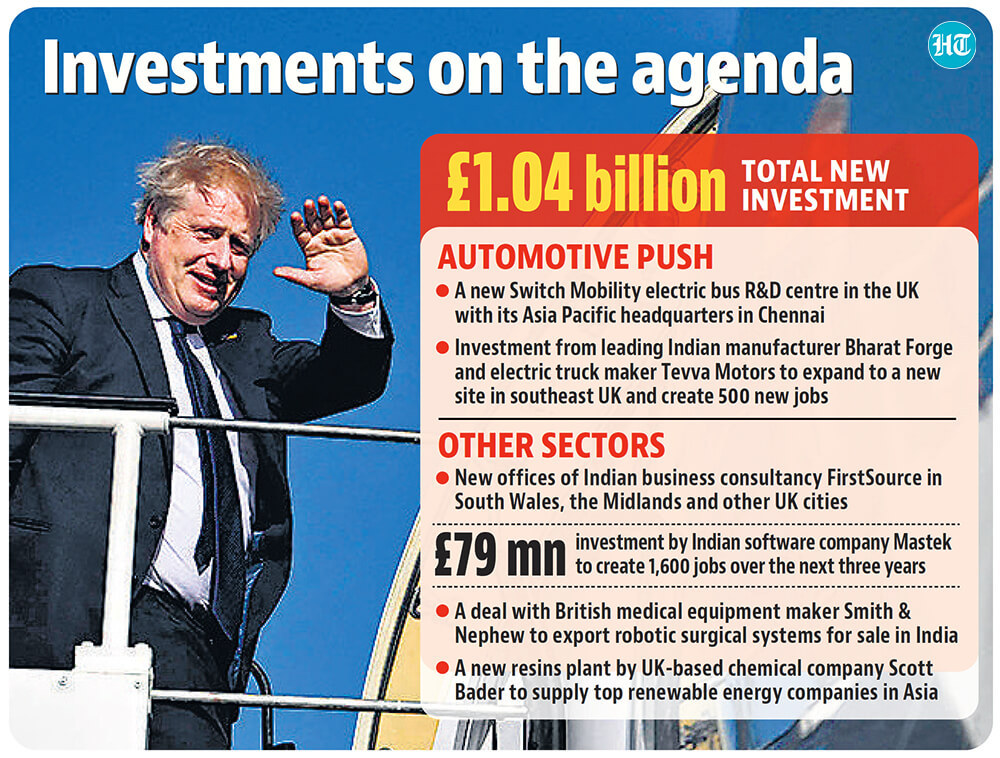
The Ukraine crisis will figure in British Prime Minister Boris Johnson’s engagements during his two-day visit beginning Thursday though the focus will be on keeping the Indo-Pacific free from coercion and giving a push to a bilateral free trade pact.
Johnson will start his visit in Gujarat, where he is scheduled to visit the Gujarat Biotechnology University and a factory, and interact with top business leaders, and then travel to New Delhi, where he will hold talks with his Indian counterpart Narendra Modi on Friday.
While the Russian invasion of Ukraine and its fallout on the world order is set to figure in Johnson’s interactions with Indian interlocutors, people familiar with the matter said the British prime minister will take the same line that foreign secretary Liz Truss had during her visit last month – that the UK is not in the business of lecturing or telling other countries what to do.
Johnson is expected to set out the British position on Ukraine and hear the Indian side so that there is a better understanding of each other’s positions, the people said. “There will be discussions on the long term consequences of the Ukraine crisis. For its part, the UK supports the freedom of Ukraine,” one of the people said, adding Russia’s behaviour will decide the future course of action in the crisis.

The UK has been at the forefront in providing military aid and support to Ukraine and Johnson recently visited Kyiv to meet President Volodymyr Zelensky. India has stopped short of publicly criticising Russia’s actions, though it has condemned the civilian killings in Bucha and repeatedly called for an end to hostilities and a return to dialogue.
Johnson’s interactions will also focus on the centrality of India in the rise of the Indo-Pacific, in keeping with the priority attached to India in the UK’s integrated review of defence, security and foreign policy in 2021, the people said.
“The Indo-Pacific is increasingly important for both sides, as is the need to keep it free from coercion and a place of opportunities that is free to all. There is also a need for democracies to become more resilient,” the person cited above said.
With defence and security one of the five pillars of the India-UK Roadmap 2030, there will also be discussions to build on the momentum created by the British carrier strike group’s visit to the Indian Ocean and joint exercises. These discussions will also look at the role the UK can play in helping India’s drive to indigenise defence manufacturing. The talks between the two prime ministers will help give shape to further defence cooperation, including Indian procurements and the transfer of technology, the people said.
Describing Johnson’s visit as a “big deal”, the people said the talks between the two prime ministers will also serve as a “staging point” for the third round of negotiations on a free trade agreement to be hosted by India from April 25. While the two sides have been able to clear some issues and make progress on market access for items such as apples, medical devices and shrimps, the next round of talks will focus on some of the bigger issues, including trade in services, investments and market access for more sensitive items.
Following its exit from the European Union (EU), the UK is keen to expeditiously conclude a comprehensive trade pact with India. Britain is interested in signing a full-fledged FTA to save time instead of opting for a two-stage deal – first, an interim or early harvest agreement, followed by a comprehensive pact, an official said.
India, however, is keen to finalise an early harvest deal before negotiating complex issues that will take time, he said. “This is a practical approach that will quickly show tangible results for both partners while other complex issues will be negotiated later,” he added.
The formal FTA negotiations started on January 13, when the two sides set a target of doubling trade in goods and services to $100 billion by 2030. Total two-way trade is currently worth $50 billion, including $35 billion in services and $15 billion in goods.
India and the UK are eyeing expeditious finalisation of tariffs and terms on matters where the interests of the two sides converge, but there are some sensitive issues that may be handled after taking on the views of all stakeholders. These include the visa issue for Britain and agriculture, dairy and duty on liquor, particularly Scotch, a second official said.
The interim deal in itself is expected to be comprehensive as it could cover 65% of goods and more than one-third of 160 lines of services, the first official said. The British side is keen on the removal of barriers to doing business and trade, including tariffs of up to 150% on whisky and 125% on British-made cars. The Indian side wants enhanced mobility for professionals and suitable safeguards for sectors such as agriculture. India holds the number one position for British visas for skilled workers, accounting for 40% of the total number.
Though the issue of economic fugitives such as Vijay Mallya and Nirav Modi could come up during the visit, the people cited above said the executive processes in these cases had been completed, while it was for the British judiciary to handle certain continuing legal processes. The British side is also willing the issue of pro-Khalistan elements in the UK, especially since it is committed to countering extremism that falls on the wrong side of the law.